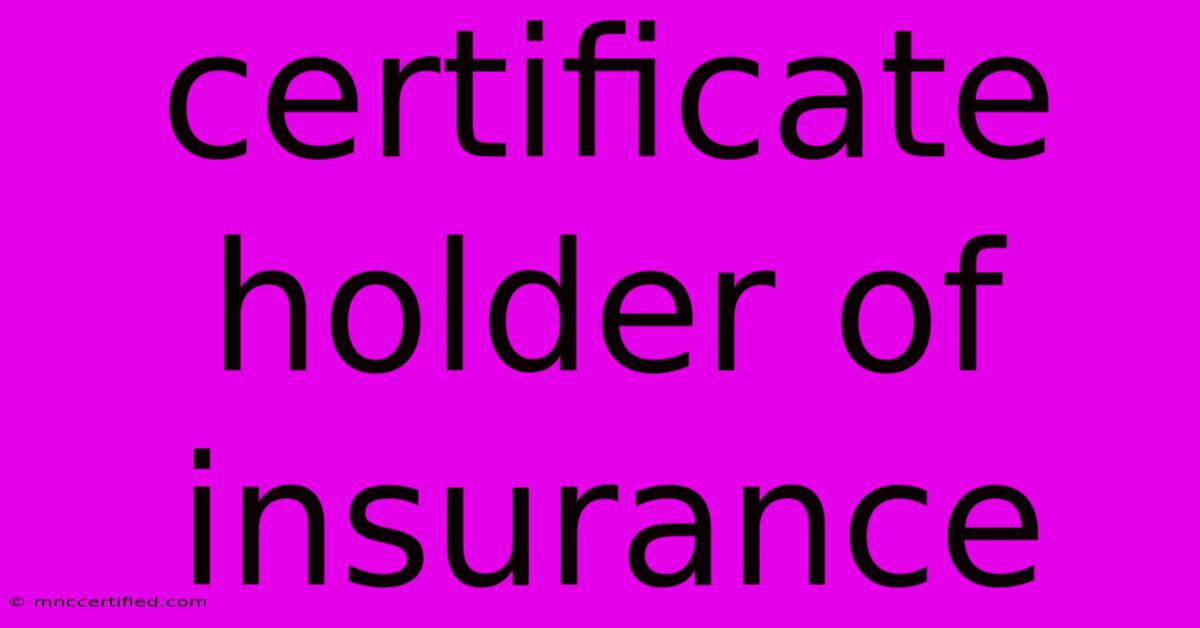Certificate Holder Of Insurance

Table of Contents
Understanding Certificate Holders of Insurance: A Comprehensive Guide
A Certificate of Insurance (COI) is a crucial document in many business transactions. It's not insurance itself, but rather proof of insurance. This article will delve into the role of a certificate holder of insurance, exploring their rights, responsibilities, and the importance of understanding this document.
What is a Certificate Holder of Insurance?
A certificate holder is the individual or entity that receives a Certificate of Insurance from an insured party. They are not a party to the insurance policy itself; they simply hold the certificate as evidence that the insured party maintains the necessary insurance coverage. Think of it as a confirmation, a snapshot of the insurance policy's key details at a specific point in time. The certificate holder is a beneficiary of this confirmation, relying on the information provided to manage risk.
Why are COIs Important for Certificate Holders?
COIs provide crucial assurance to certificate holders. They help mitigate risk by verifying that the insured party carries sufficient liability coverage to protect the certificate holder in case of an incident. This is especially critical in various situations including:
- Construction projects: General contractors often require subcontractors to provide COIs demonstrating adequate liability and workers' compensation insurance.
- Rental agreements: Landlords may require tenants to provide COI showing liability coverage to protect the property.
- Event planning: Event organizers often require vendors to provide COIs to safeguard against potential liabilities.
- Business partnerships: Businesses working together might exchange COIs to demonstrate their respective insurance coverage.
Information Contained in a Certificate of Insurance
A typical COI includes the following information:
- Insured's Name and Address: Clearly identifies the party carrying the insurance.
- Insurer's Name and Address: Specifies the insurance company providing coverage.
- Policy Number: A unique identifier for the insurance policy.
- Effective and Expiration Dates: Shows the period of coverage.
- Type of Insurance: Specifies the coverage type (e.g., General Liability, Workers' Compensation, Automobile Liability).
- Limits of Liability: Indicates the maximum amount the insurer will pay for covered losses. This is a critical piece of information for the certificate holder.
- Certificate Holder's Name and Address: Identifies the party receiving the certificate.
- Additional Insured Status (if applicable): Indicates whether the certificate holder is named as an additional insured on the policy.
Understanding Limitations of a COI
It's vital to remember that a COI is not a substitute for the actual insurance policy. It is merely a summary and does not represent the complete terms and conditions. The certificate holder should be aware of these limitations:
- Accuracy: Errors or omissions can occur on a COI. Always verify the information with the insured party or the insurer if you have concerns.
- Amendments: The COI reflects the coverage at the time of issuance. Any subsequent changes to the policy are not automatically reflected on the certificate.
- Legal Standing: A COI does not grant the certificate holder any legal rights under the insurance policy.
Best Practices for Certificate Holders
- Request COIs proactively: Don't wait until an incident occurs. Request a COI before entering into any agreement where insurance coverage is a critical factor.
- Verify the information: Double-check the details on the COI with the insured party or the insurance company to ensure accuracy and validity.
- Understand the limitations: Be aware that a COI is a summary, not the full policy.
- Maintain updated COIs: Request updated COIs periodically, especially for long-term agreements.
- Consult with legal counsel: If you have any doubts or concerns about the adequacy of the insurance coverage, seek professional legal advice.
By understanding the role of a certificate holder of insurance and the limitations of a COI, businesses and individuals can better manage their risk and protect their interests. Remember, a COI is a valuable tool but should be used in conjunction with other risk management strategies.

Thank you for visiting our website wich cover about Certificate Holder Of Insurance. We hope the information provided has been useful to you. Feel free to contact us if you have any questions or need further assistance. See you next time and dont miss to bookmark.
Featured Posts
-
Arsenals Win Aston Villas Loss Premier League
Nov 24, 2024
-
Confirmed Chelsea Starting Xi Vs Leicester
Nov 24, 2024
-
Springboks Dominant Wales Winless
Nov 24, 2024
-
Commercial Truck Insurance Ohio
Nov 24, 2024
-
Insurance Without License Texas
Nov 24, 2024